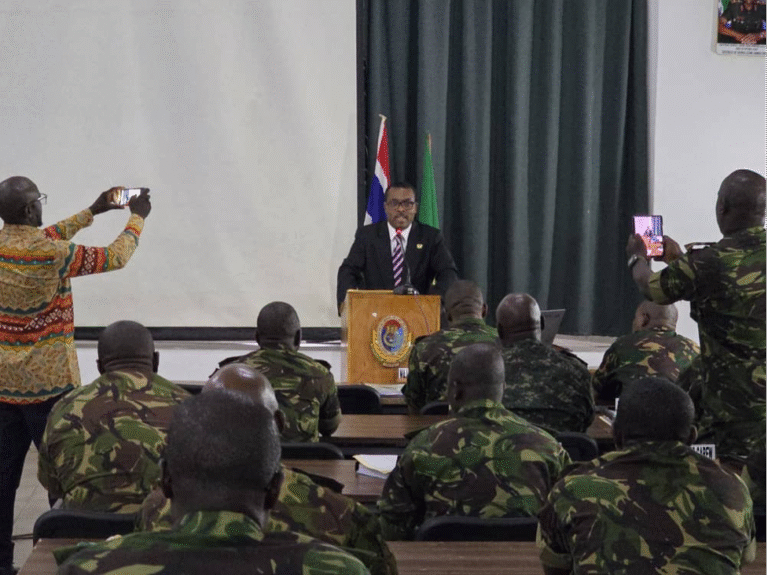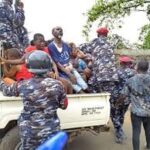By David Jabati & Ayodele Deen Cole
Leaders of the All Peoples Congress (APC) have expressed deep concern over the growing internal contradictions within both the membership and leadership of the party.
As the political tempo increases in anticipation of the 2028 general elections, the opposition APC finds itself at crossroads. Recent splits have given rise to several factions, including one aligned with the party’s 2023 presidential candidate, Dr. Samura Kamara. This internal strife threatens to derail the APC’s prospects in the next election cycle.
Once a united and formidable opposition force, the APC now faces a defining moment. The decisions it makes in the coming months could either restore its political prominence or further relegate it to the margins of Sierra Leone’s political landscape.
Despite efforts by the party leadership to position the APC for victory in 2028, aggrieved members continue to sow division. Some political observers argue that the party lost its footing when it chose to negotiate the controversial June 24, 2023, general election result declared in favor of incumbent President Julius Maada Bio of the ruling Sierra Leone People’s Party (SLPP), rather than challenge them outright.
To reclaim its stature, the APC must strike a delicate balance between strategic vision and grassroots connection. The party’s success now hinges on its ability to select a flagbearer who is not only electorally viable but also embodies qualities that resonate with ordinary Sierra Leoneans.
Analysts stress the importance of choosing a candidate with proven competence, grassroots appeal, a solid track record of public service, and support from key demographics such as youth, women, and traditional institutions.
There is growing concern, however, that unless party elders and veterans step in to resolve the ongoing crisis ahead of the 2026 National Delegates’ Convention, the internal strife could escalate and cost the APC the 2028 elections.
One figure who continues to spark debate within the party is Dr. SamuraKamara. Widely seen by a good number of members and supporters of the party as the right leader and a respected former civil servant, Kamara’s grassroots popularity and experience make him a strong contender. The APC’s upcoming decisions will serve as a litmus test of its readiness to reclaim national leadership. Ignoring a candidate of JFK’s caliber would be a costly gamble. Embracing his leadership, however, could be the game-changing move the APC needs.
Meanwhile, uncertainty still looms over Kamara’s current status within the party; whether he will be accepted as the leader, an ordinary ex-officio member, or something else entirely. Similar ambiguity surrounds former Vice President Alhaji Sam Sumana, whose membership status remains unresolved. Will he be allowed to run for the 2028 flagbearer ticket? Is the question on the lips of many concerned APC members and supporters.
According to political analysts, the APC is “walking a tightrope.” Some party elites have openly vowed not to work with Kamara again, citing lingering bitterness from the 2023 election loss. The ongoing crisis, they say, is a direct consequence of the unresolved dispute over the 2023 general elections.
Efforts by the national leadership to reconcile rival factions have so far yielded limited success. Analysts emphasize that for the APC to move forward, it must confront its internal challenges head-on and prioritize unity.
There are fears among party loyalists that this fragmentation could not only prevent the leadership from being re-elected at the convention but also cost the APC a real shot at the presidency in 2028. Public displays of disunity, such as the existence of two separate factions at official events – one backing Kamara, the other supporting the current executive, have only deepened the crisis.
Another major point of contention is the reconciliation process ahead of the 2026 National Delegates’ Convention. Will the APC approach the convention as a fractured entity, or will it forge a path toward unity after its 2023 loss? Is the question that begs for answer.
A related issue involves the ongoing new membership registration. Some senior members have refused to participate and are discouraging others from registering, citing dissatisfaction with the current leadership and calling for a total overhaul of the party’s executive.
These internal challenges have led many to question the APC’s seriousness about contesting and winning the 2028 elections. The party’s stance on electoral justice also remains unclear. While the Kamara-aligned faction continues to support the pursuit of justice for the 2023 elections, tangible progress has been minimal, aside from the release of the Tripartite Committee report.
Many APC members are now asking whether the party will ever secure electoral justice, and whether it has any strategic plan in place to prevent election rigging in 2028. The APC currently lacks a comprehensive roadmap for victory and has not been active in engaging with national and international stakeholders on implementing the more than 80 recommendations from the Tripartite Committee.
Political observers warn that unless the APC takes decisive steps soon, it risks permanent relegation to the opposition. The leadership must adopt fresh strategies, resolve its internal leadership crisis, and place the right individuals in the right roles, especially ahead of the 2026 convention.
Going forward, unity, strategic planning, and grassroots mobilization must be the party’s top priorities. Though the APC is currently in disarray, it is within this chaos that the seeds of renewal can be sown. To rise again as a formidable political force, the APC must shed outdated leadership models, embrace reform, and recommit to the aspirations of the people of Sierra Leone.
Only then can the APC reclaim its legacy-and truly contest for power in 2028.







